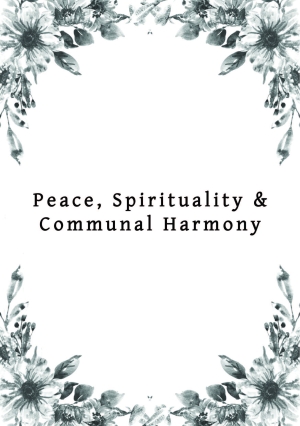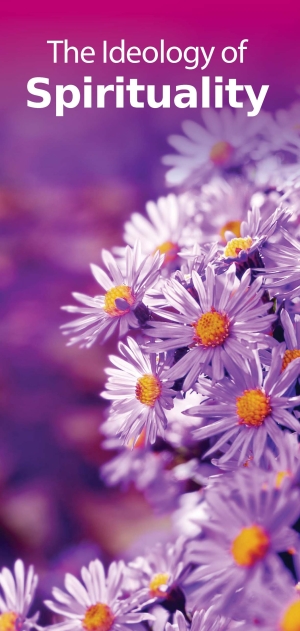De-conditioning of the mind can only be done by one process alone: introspection. This is a continuous, merciless examination of ourselves to improve. This improvement can come in two ways. First, one is to accept the harsh criticism of others by acknowledging their external ‘hammering’ with an open mind. Without being offended, one should take on board harsh criticism from others and, after an objective analysis, carry out a complete re-assessment of oneself.
The other method of de-conditioning can be called ‘self-hammering’. This is to look at ourselves with a critical eye, evaluate ourselves day and night, perceive every mistake with severity, and then introspect by mercilessly ‘hammering’ ourselves without giving ourselves any concessions. Instead of accusing others, we should analyse ourselves objectively and find our faults.
These are the only two possible ways of de-conditioning. Either one accepts the ‘hammering’ of others, or one becomes one’s own worst critic by ‘self-hammering’. The one who likes to hear good things about himself from others and makes excuses for his mistakes will always remain a conditioned person and will never be able to decondition or purify his mind.
Introspection is a major source of deconditioning. Introspection awakens the human mind, it jolts the human personality, it gives the individual the incentive to reform himself. In this way, introspection leads one to intellectual and spiritual development through the process of deconditioning.
Featured Articles
Featured Videos
FAQs
Introspection is essential to de-condition oneself. Everyone is born in an environment that exerts an influence on him. This is a process of conditioning. This is true of everyone without exception. And it is a problem for everyone because such conditioning causes one to deviate from nature. That is why it is essential that everyone de-condition himself and return to his original nature.
There is only one way to decondition oneself and that is by introspection. This entails rigorously continuing to engage in the act of self-reform. There are two ways to do this. One is to tolerate the harsh criticism of others, that is, accepting with an open mind any adversarial evaluation of one’s thinking and conduct without taking this to heart, one should engage without delay in one’s self-reassessment.
Another method of deconditioning is self-criticism. That is, one should look at himself like an enemy. He should assess himself morning and evening. He should keenly feel his mistakes and then he should introspect. He should engage in a merciless hammering of his ego. In no matter should he make concessions to himself. Instead of blaming others, he should always first blame himself. He should become such a severe critic of himself, that it is as if he is trying to put an end to himself.
These are the only two methods of de-conditioning oneself. Either one accepts the harsh criticism of others or one becomes a harsh critic of oneself. Those who always want sweet polite words from others, and those who always make concessions to themselves will always remain in a conditioned state, and will never be able to de-condition themselves.
Source: Discovering God
Tazkiyah is the process of de-conditioning, which is a continuous process that goes on day in and day out. When it does not happen in this way, there is a hadith which describes the result of this: “The heart becomes covered with rust, just like iron when it comes in contact with water.” A question was asked: “O Prophet! What is the way to purify or clean one’s heart?” The Prophet replied, “Remembering death often and studying the Quran.” (Shu‘ab al-Iman, al-Bayhaqi, Hadith No. 1859)
This tradition of the Prophet tells us of a psychological reality. That is, in the context of the society he lives in, a person has repeatedly to undergo such experiences as produce negative feelings within him, for instance, anger, hatred, violence, revenge, and so on. An individual ought to bury these feelings instantly, for, if he fails to do so, they will become a permanent presence in the human mind, and a time will come when it will be almost impossible to eliminate them.
There are two major parts of the human mind, the conscious and the unconscious. It is quite natural for negative feelings to first of all enter the conscious part of the mind. If such feelings are not immediately cast out from the mind, they gradually reach the unconscious part of the mind, from where it becomes difficult to eradicate them. One should always remain vigilant about this. At all times a person should keep converting his negativity into positivity. That is, he must de-condition his conditioned mind in order to purify it and keep it free from pollution. The only way of purification, or de-conditioning, is to repeatedly remind himself of death and to reflect on the purpose of life.
Source: Discovering God
Yes. De-conditioning is essential to develop a positive personality. And tazkiyah is the method for this. Tazkiyah or purification of the mind is compulsory for all men and women. This entails their resisting and overcoming the influences of their environment which we describe as conditioning. In consonance with one’s feelings and desires people develop certain habits. Consciously or unconsciously under the influence of their interests, they become conditioned in such habits. All these things create obstacles to their leading a spiritual life. To overcome these obstacles, an individual has to become his own guide. He must identify his mistakes, and apply to himself the process of rigorous de-conditioning. This is a prerequisite for purification. Without this, no one can be genuinely purified. No one can get entry into Paradise, without self-purification.
Those who have been successful in engaging in these processes, discover the truth. They have been mentioned in the Quran as “soul at peace” (89:27). They are the ones who fell in line with the creation plan of God and who developed in themselves the desired personality according to His creation plan. These are the ones who will be rewarded by God and will gain entry into Paradise.
Source: Discovering God









